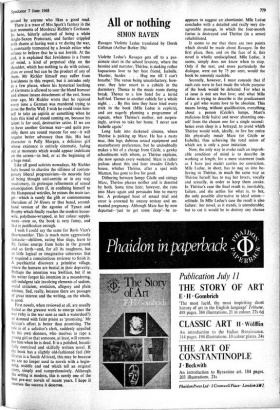All or nothing
SIMON RAVEN
Ravages Violette Leduc translated by Derek Coltman (Arthur Barker 30s)
Violette Leduc's Ravages gets off to a pas- sionate start in the school lavatory, where the heroine and narrator, Therese, is making rather loquacious love to her best friend, Isabelle. 'Harder, harder. . . . Hug me till I can't breathe.' The venue being unsatisfactory, how- ever, they later resort to a cubicle in the dormitory. Thence to the music room during break. Thence to a low hotel for a torrid half-hol. Thence to another cubicle for a whole night. . . . By this time they have tried every trick in the book (Mlle Leduc is explicit), and are eagerly planning a programme of repeats, when Therese's mother, not surpris- ingly, arrives to take her home. 'I never saw Isabelle again.'
Long fade into darkened cinema, where Therese is picking up Marc. He has a nasty mac, thin legs, dubious sexual equipment and masturbatory preferences, but he undoubtedly makes a bit of a change from Cecile, a gawky schoolmarm with whom, as Therese explains, she now spends every weekend. Marc is rather jealous about this and later invades Cecile's house, whither Therese, after a spat with Maman, has gone to live for good.
Dithering between lumpy Cecile and stringy Marc, Therese pleases neither and is deserted by both. Some time later, however, she runs into Marc again and persuades him to marry her. A prolonged bout of sexual trial and error is crowned by uneasy ecstasy and un- wanted pregnancy. Although Marc has by now departed—'just to get some sleep'—he re-
appears to suggest an abortionist. Mlle Leduc concludes with a detailed and really very dis- agreeable passage, in which the four-month foetus is destroyed and Therese (in a sense) rehabilitated.
It seems to me that there are two points which should be made about Ravages. In the first place, then, and on the face of it, this novel is wholly undisciplined. Mlle Leduc, it seems, simply does not know when to stop. Only if the text, and more particularly the dialogue, were cut by 75 per cent, would the book be remotely readable.
Secondly, however, I must concede that if such cuts were in fact made the whole purpose of the book would be defeated. For what is at issue is not sex but love; and what Mlle Leduc is trying to describe is the predicament of a girl who wants love to be absolute. This means loving, without qualification, everything about a person (Cecile's lumps, Marc's malicious little hairs) and never absenting one- self from the chosen one for a single second : hence even sleep is a betrayal, to avoid whict Therese would wish, ideally, to live her entire life physically inside Marc (or Cecile or Isabelle), thus achieving the total union of which sex is only a poor imitation.
Now, the only way to evoke such an improb- able condition of mind is to describe its working at length, for a mere statement (such as I have just made) carries no conviction. Mlle Leduc, in short, has to nag us into be- lieving in Therese, in much the same way as Therese herself has to nag her lovers, vocally and sexually, in order to keep them awake. In Therese's case the final result is, inevitably, failure, and she settles for what is, to her, the only possible alternative to ideal union— solitude. In Mlle Leduc's case the result is also lailure: her novel, as it stands, is unendurable; but to cut it would be to destroy any chance of achieving what she aims at. There can be no compromise: either we must have all 427 pages (300 of them being wearisome beyond belief) or none at all. Since Mlle Leduc, at her best, is a powerful writer, the choice is a pain- ful one.







































 Previous page
Previous page